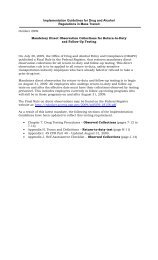FTA Oversight Procedures - Federal Transit Administration - U.S. ...
FTA Oversight Procedures - Federal Transit Administration - U.S. ...
FTA Oversight Procedures - Federal Transit Administration - U.S. ...
Create successful ePaper yourself
Turn your PDF publications into a flip-book with our unique Google optimized e-Paper software.
Management Plan; these recommendations shall be developed in accordance with the following,<br />
and shall be organized appropriately by Risk Type, Mitigation Structure and Mitigation Type as<br />
described below.<br />
6.6.1.1 Risk Types<br />
Risk recommendations associated with Risk Events shall be classified as technical, schedule or cost<br />
risk, or some combination thereof.<br />
Technical Risk is performance risk that is manageable by the Grantee and its consultants and<br />
contractors; unresolved technical risk may threaten the planned schedule and/or budget. For<br />
example, construction‐phase technical risk events may include those associated with the<br />
uncertainty surrounding mobilization of a tunnel boring machine and its planned production rates.<br />
If output, reliability, availability, etc. do not meet plan, the variance may impact schedule or cost.<br />
Failure to successfully mitigate such technical risk within the technical risk mitigation framework<br />
can, in short measure, exceed the ability of the project schedule to absorb the impact. If the<br />
schedule mitigation fails, the cost mitigation framework is stressed in turn to absorb the impact of<br />
added production costs and schedule delays that it may or may not be able to contain.<br />
Schedule Risk is fundamentally risk to the project schedule and may additionally threaten the<br />
project budget. Delays to the project critical path will directly delay the project, and significant<br />
reductions to schedule float will reduce the ability of the project to withstand schedule change.<br />
Failure to successfully mitigate such schedule risk can, in short measure, exceed the ability of the<br />
project schedule to absorb the impact of delay. If the schedule mitigation fails, the cost mitigation<br />
framework is stressed in turn to absorb the impact of schedule delays that it may or may be able to<br />
contain.<br />
Not all schedule risk is driven by technical risk, but all technical risk drives schedule risk.<br />
Cost Risk is fundamentally about risk to the project budget. Risk events associated with cost risk<br />
may additionally threaten the planned schedule.<br />
6.6.1.2 Mitigation Structure<br />
Mitigation structure refers to varying levels by which the Grantee and its consultants and<br />
contractors may respond to the risk events and assessed risk levels identified through prior<br />
products of this OP‐40. This structure consists of three parts: Primary Mitigation, Secondary<br />
Mitigation, and Tertiary Mitigation.<br />
Primary Mitigation occurs throughout the various project phases and is the result of the planned<br />
actions of the Grantee and its consultants and contractors as described in the Risk Management<br />
Plan portion of the Project Management Plan, as supplemented with the PMOC’s recommendations<br />
resulting from this OP‐40. Such activities are scheduled at the earliest phase during which the<br />
mitigation activity may occur, and are expected to be completed on a timely basis to achieve the<br />
cost‐risk parameter targets at the end of that phase, as developed in 6.2.2. Examples of scheduled<br />
mitigation might be completing design, or a geotechnical survey, etc.<br />
Secondary Mitigation consists of pre‐planned, potential scope or process changes that may be<br />
triggered when risk events occur that exceed certain phase‐based targets, described further below.<br />
OP 40 Risk Assessment and Mitigation Review<br />
Revision 0, June 2008<br />
Page 9 of 16

















